Engulfed by four years of total war, the world emerged transformed.
The conflict that ripped through national borders and eroded centuries-old power dynamics receded, and in its wake swelled a storm that redefined citizenship and just governance. Amid the unfamiliarity of wartime and post-war societies, populations were both bound by tradition and buoyed by bids to reshape political, economic and social landscapes. Some who once marched into combat for their leaders now marched against them. Tensions rippled from one continent to the next, stirring revolutions and reforms.
Join us as we examine – from the battlefield to the ballot box – the evolution of citizenship during World War I and its legacy through the century.
Watch the presentations from Shifting Tides on YouTube
Presenters
Gary Armstrong
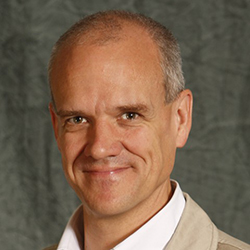
Gary T. Armstrong is the Interim Vice President of Academic Affairs and a professor of political science at William Jewell College. He earned his Ph.D. in 1994 at Georgetown University, where he served as research assistant to political scientist, political economist and author Francis Fukuyama, as well teaching assistant to former U.S. Secretary of State Madeleine Albright. His dissertation focused on the clash between Woodrow Wilson, Theodore Roosevelt and Henry Cabot Lodge over terminating the war with Imperial Germany in 1918. Armstrong is both an instructor and alumnus of The Fund for American Studies (TFAS) in Washington, D.C., where he teaches American foreign policy. His research interests include war termination and war ethics.
Jonathan Boff
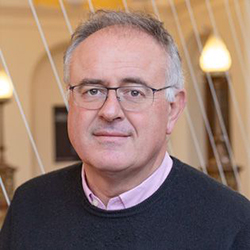
Jonathan Boff is a Reader in History and War Studies at the University of Birmingham. He specializes in the military history of the First and Second World Wars, with particular interest in the construction of grand strategy and in institutional innovation and adaptation under stress. Currently an AHRC Leadership Fellow, he is researching a book on money in wartime which will be published by Oxford University Press in 2024. His last monograph, “Haig's Enemy: Crown Prince Rupprecht and Germany's War on the Western Front, 1914-18" was published by Oxford University Press in 2018 and won the British Army Book of the Year award as well as joint winner of the World War One Association’s Tomlinson Prize. Educated at Merton College, Oxford and the Department of War Studies, King's College London, Boff spent twenty years working in finance before returning to academia. He serves on the councils of the National Army Museum and Army Records Society, has worked as a historical consultant with the British Army and the Chairman of the Joint Chiefs (USA) and is a Fellow of the Royal Historical Society.
"Sacrifice and Savers: Citizenship in Wartime"
The First World War saw economics used as a weapon as never before. Whether Allied or Central Power, each tried to blockade the other into submission at or under the sea. Less famous, however, is the way both sides used money to mobilize support for the war effort, encouraging their people to save and to go without until sacrifice became a mark of good citizenship.
Sara Egge
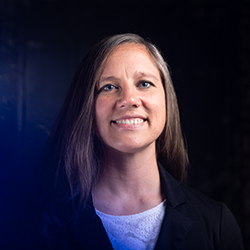
Sara Egge is the Claude D. Pottinger Professor of History at Centre College in Danville, Ky. She received her Ph.D. from Iowa State University with emphases in rural, political and gender histories. At Centre College, Egge teaches courses on citizenship theory, the United States in World Wars I and II, and gender history in the United States. She has published articles in several journals, including Agricultural History, the Middle West Review and the Annals of Iowa. Her scholarship on woman suffrage and citizenship became a book entitled “Woman Suffrage and Citizenship in the Midwest, 1870-1920,” which won the Benjamin Shambaugh Award for best book in Iowa history and the Gita Chaudhuri Prize from the Western Association of Women Historians for the best book on rural women from any time and any place.
"Sacrifice and Loyalty: Woman Suffrage, Citizenship, and World War I"
The patriotic fervor that erupted in the United States during World War I upended expectations about citizenship. Public calls for service to the nation were inclusive of American women, and thousands mobilized for the war effort. But women’s war mobilization only partly explains why politicians previously opposed to woman suffrage ultimately embraced it. Nativist sentiments, aimed mostly at Germans, exploded during the war, leading to xenophobic federal legislation such as the Alien and Sedition Acts. Suffragists were often the loudest opponents of declarant suffrage – voting by noncitizens who had not finished the naturalization process – and their efforts to disenfranchise legally voting noncitizens while simultaneously demanding the ballot for themselves reveals how WWI exposed the contradictory nature of citizenship.
Richard Shawn Faulkner
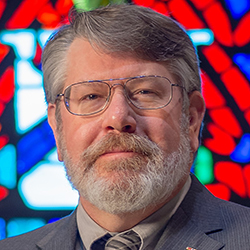
Richard Shawn Faulkner is a Professor of Military History of the United States Army Command and General Staff College at Fort Leavenworth, Kan. He served for 23 years in the Army as an armor officer. His assignments included serving as a tank company commander in the 1st Armored Division during Operation Desert Storm and as an instructor of American History at the United States Military Academy at West Point. He holds a master's degree in American History from the University of Georgia and a PhD in American History from Kansas State University. He is the author of “The School of Hard Knocks: Combat Leadership in the American Expeditionary Forces” (Texas A&M Press, 2012), which was the recipient of the Society for Military History's 2013 Distinguished Book Award. His second book, “Pershing's Crusaders: The American Soldier in World War I” was published by the University Press of Kansas in 2017.
Richard Fogarty
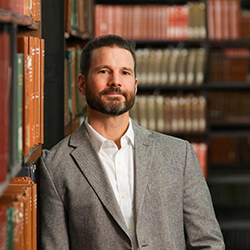
Richard S. Fogarty earned his Ph.D. in History at the University of California, Santa Barbara, and is Associate Professor of History at the University at Albany, State University of New York. He is the author of “Race and War in France: Colonial Subjects in the French Army, 1914-1918" (2008) and the co-editor of “Empires in World War I: Shifting Frontiers and Imperial Dynamics in a Global Conflict” (2014) and of the Africa section of “1914-1918-online, International Encyclopedia of the First World War.” He is currently working on a book about the French colonial empire during the First World War, “Greater France and the Great War,” and a longer-term project about Muslim North African prisoners of war in Germany tentatively titled “Under Strange Moons: Islam, Captivity and Contested Identities during the First World War.”
"Aux armes, citoyens! Military Service and National Belonging in the French Colonial Empire"
The French republican national anthem, “La Marseillaise,” famously called to arms its newly empowered citizens in 1798. In 1914, in another moment of invasion and existential peril, the French Republic once again called upon its citizens to defend the nation—the guarantor of their rights to liberty, equality and fraternity. But the call also went out to men and families who did not enjoy these rights, and whose homes were far away from the German armies that threatened the French homeland. Republican traditions tying military service to citizenship were powerful, leading to some attempts to recognize colonial subjects’ service through expanded political rights. The stories of the successes and failures of these efforts tell us much about the ways the Great War did and did not reshape ideas about citizenship.
Alice Kessler-Harris
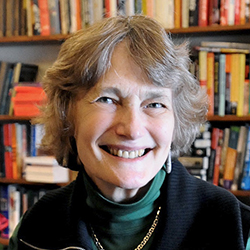
Alice Kessler-Harris is the R. Gordon Hoxie Professor of American History, Emerita, at Columbia University where she was also Professor in the Institute for Research on Women and Gender and held appointments in the Columbia University School of Law. Kessler-Harris specializes in the history of American labor and twentieth-century social policy. The author of four books, her work “In Pursuit of Equity: Women, Men and the Quest for Economic Citizenship in Twentieth Century America” (2001), which won the Bancroft, Taft, Joan Kelly and Herbert Hoover prizes. She is best known for the now classic “Out to Work: A History of Wage-Earning Women in the United States” (1982, 2001). She is co-editor of, among other books, “Protecting Women: Labor Legislation in Europe, Australia, and the United States, 1880-1920" (1995), “Democracy and Social Rights in the ‘Two Wests’” (2009) and “Democracy and the Welfare State” (2018), which explores the impact of expanding citizenship rights in Western Europe and the U.S.
Kessler-Harris is an elected member of the American Academy of Arts and Sciences and of the American Philosophical Society. She is a past president of the American Studies Association, the Labor and Working Class History Association and the Organization of American Historians.
"Paradoxes of Women’s Citizenship: The War and After"
We imagine World War I, and perhaps war in general, as moments when women grasp new opportunities to abandon old customs and expectations. In the United States, women became freer, job opportunities more available and after 50 years of struggle, they won the vote. They seemed in line to become more active participants in our democracy. But a closer look at the effects of the war reveals a more complicated story about the effects of women’s expanded citizenship. This lecture will explore some of the paradoxical implications of women’s new freedom.
Eric Lohr
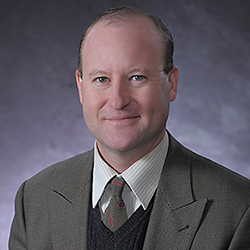
Eric Lohr is Chair of the History Department at American University whose research interests include Russia in early 20th Century, particularly during its revolutionary period and World War I. Lohr is the author of “Russian Citizenship: From Empire to Soviet Union” (Harvard University Press, 2012) and “Nationalizing the Russian Empire: The Campaign Against Enemy Aliens during World War I” (Harvard University Press, 2003). He previously taught at Harvard as an assistant professor of History (2000-2003). He is currently writing “The Brothers Trubetskoi: Between Tsar and Revolution” and “Russia’s War, 1914-1918: From Total Mobilization to Total Demobilization.”
"Russian Citizenship during WWI"
The Russian Empire closed its borders to migrants going in or out, stopped naturalization of foreigners, and conducted a massive campaign to intern German, Austrian and Ottoman subjects and to expropriate their (extensive) properties and businesses. German-owned businesses accounted for a very substantial portion of the most advanced sectors of the Russian economy, so these measures were significant both for the war effort and as a precedent for the massive increase in state involvement in the economy during the war. All these measures were implemented in global action—reaction with other great powers at war.
Michelle Moyd
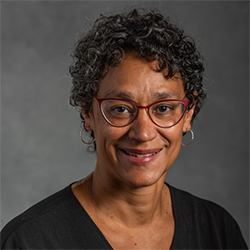
Michelle Moyd is an Associate Professor of History at Michigan State University, where she is a Red Cedar Distinguished Faculty member. She received her Ph.D. in History from Cornell University in 2008 and held residential fellowships at the Institute for Historical Studies at the University of Texas—Austin and at the International Research Center on Work and Human Lifecycle in Global History in Berlin. A historian of eastern Africa, Moyd’s special interests focus on the region’s history of soldiering and warfare. Her first book, “Violent Intermediaries: African Soldiers, Conquest, and Everyday Colonialism in German East Africa” explores the social and cultural history of African soldiers (askari) in the colonial army of German East Africa, today’s Tanzania. She is at work on a short book entitled “Africa, Africans, and the First World War,” which will examine the spectrum of African experiences in the war, especially as soldiers and workers. Before joining the MSU faculty, she was Ruth N. Halls Associate Professor of History at Indiana University, Bloomington.
"Rites, not Rights: African Politics and Citizenship after World War I"
In most of Africa after World War I, African peoples remained subject to (and subjects of) colonial governance. Their struggles to rebuild their lives and livelihoods after the war took place amidst entrenched imperial racisms and refusal of African humanity. With these conditions in mind, explore the limits of "citizenship" as a political reference point in Africa's postwar period.
Amanda Nagel
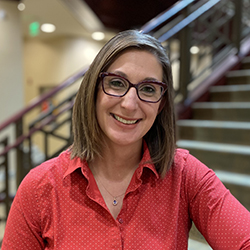
Amanda M. Nagel received her Ph.D. from the University of Mississippi. Her research centers on race, war, empire, Jim Crow and citizenship in the United States between 1898 and 1926. She is currently revising a manuscript, “He thinks He is a Soldier: Race, Empire and the United States, 1898-1926,” for the University of Virginia Press, expected to appear in 2024. She also recently published an essay titled “African American Soldiers in World War I” with Oxford University Press’s Research Encyclopedia of American History in February 2021. She is currently an Associate Professor of Military History at the School of Advanced Military Studies, Command and General Staff College at Fort Leavenworth, Kansas.
"Making the World Safe for Democracy: African American Citizenship and WWI"
In 1919, W. E. B. Du Bois’s editorial “Returning Soldiers” noted that the community needed to “marshal every ounce of our brawn to fight a sterner, longer, more unbending battle.” He deftly and concisely summarized what it meant to resist the limited citizenship experienced throughout the United States. As groups enforcing Jim Crow were often endorsed by government officials, many found a battle raging on both sides of the Atlantic. This lecture will examine the experiences of African American soldiers during the War, and their relationship to citizenship amidst the Black freedom struggle and the long civil rights movement in the United States.
Priya Satia
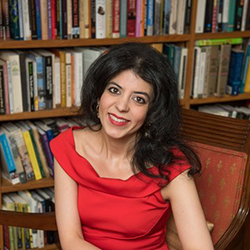
Priya Satia is the Raymond A. Spruance Professor of International History and Professor of History at Stanford University, specializing in modern British and British empire history. She is the award-winning author of three books: "Spies in Arabia: The Great War and the Cultural Foundations of Britain's Covert Empire in the Middle East" (2008); "Empire of Guns: The Violent Making of the Industrial Revolution" (2018); "Time's Monster: How History Makes History" (2020). Prof. Satia's work has also appeared in scholarly journals, such as the American Historical Review, Past and Present, Technology and Culture, Humanity, Annales, and History Workshop Journal. She often writes for mainstream media such as the Financial Times, Washington Post, and Time Magazine, among others. Satia is currently working on a history of colonialism in Punjab.
"The Great War in the Middle East"
Campaigns of the First World War in the Middle East helped renew British faith in Victorian ideals of heroism and technological progress despite the traumas of the Western Front and shaped struggles for democratic oversight after the war. Secrecy around British activity in the Middle East enabled imperialism to subvert the anti-imperial priorities of a mass-democratic postwar society. Wartime secrecy laid the foundation for Western powers' reliance on covert action and airpower as their primary modes of with the Middle East since that time.
Scott Stephenson
Dr. Scott Stephenson is professor emeritus of Military History at the U.S. Army Command and General Staff College. His research focuses on the German Empire and its downfall. His book "The Final Battle: Soldiers of the Western Front and the German Revolution of 1918" was awarded the 2010 Tomlinson Prize for Best Book in English on World War I. He is a graduate of the United States Military Academy at West Point and served for 25 years as an Army officer and almost 30 years on the faculty of the Command and General Staff College.
Christopher Warren

Christopher Warren, JD, Ph.D., serves as the Vice President of Collections and Senior Curator at the National WWI Museum and Memorial. Dr. Warren worked as the Director of Curatorial Affairs at the Smithsonian National Postal Museum, Curator of American History at the Library of Congress, Senior Historian at Arlington National Cemetery and as a historian and curator for the U.S. Department of Defense. He has authored articles in numerous publications including the Journal of the American Revolution, MHQ: The Quarterly Journal of Military History, Federal History Journal and Naval Aviation News, and routinely teaches and lectures on historic topics. His doctoral dissertation, currently being edited for publication, focuses on the burial and memorialization of Confederate dead in national cemeteries and its effect on the nature of commemoration, reunification, gender, race relations and politics in turn-of-the-century America.
Vanda Wilcox
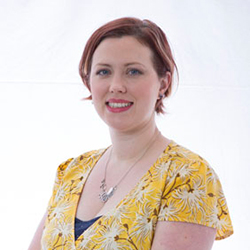
Vanda Wilcox is a historian of Italy in the early twentieth century, with interests in military, colonial and cultural history. Since earning her DPhil at the University of Oxford in 2006, she has taught at John Cabot University and Trinity College, Rome Campus and currently resides in Milan where she works as an independent researcher. She is currently researching a new history of Italian imperialism in the nineteenth and twentieth centuries. Her publications include “The Italian Empire in the Great War” (Oxford 2021), “Italy in the Era of the Great War” (ed., Leiden 2018) and “Morale and the Italian army in the First World War” (Cambridge 2016).
"Marching on Capitals: The Veteran Citizen in Italy, Germany, and the United States" (Panel with Richard Faulkner and Scott Stephenson)
As servicemen, they were the cutting edge of their nation’s swords in times of war. Upon returning home after the guns fell silent, some felt betrayed, others felt that their duty had been done and it was time to live a peaceful life, and some felt like they were owed more. While the veterans of each nation experienced the Great War differently, the post-war years saw veterans around the world become active in similar ways. Join historians Dr. Richard Faulkner, Dr. Scott Stephenson, and Dr. Vanda Wilcox as they look at the ways in which the veterans of the United States, Germany, and Italy returned home, attempted to reintegrate to society, and sometimes even marched on capitals.
Schedule
Thursday, Nov. 3
10 a.m.-5 p.m. Museum and Memorial open
3-5 p.m. Check-in at Museum and Memorial Guest Services
Friday, Nov. 4
10 a.m.-5 p.m. Museum and Memorial open
7:30-8 a.m. Shuttle service from the Hampton Inn Hotel to the Museum and Memorial
8-8:30 a.m. Check-in for attendees at the Museum and Memorial
8:30-8:40 a.m. Welcome | Matthew Naylor
8:40-9:40 a.m. Session 1 | Gary Armstrong
9:40-10 a.m. Break | Museum Store opens
10-11 a.m. Session 2 | Alice Kessler-Harris
11 a.m.-12:20 p.m. Session 3 | Panel with Richard Shawn Faulkner, Scott Stephenson and Vanda Wilcox
12:20-1 p.m. Lunch at the Museum and Memorial | Book Signing
1-2 p.m. Session 4 | Priya Satia
2-2:15 p.m. Break
2:15-3:35 p.m. Session 5 | Panel with Richard Fogarty and Michelle Moyd
3:35-3:45 p.m. Break
3:45-4:45 p.m. Session 6 | Sara Egge
4:45-5:30 p.m. Shuttle service between the Museum and Memorial and the Hampton Inn Hotel
5-5:30 p.m. Research Level Expansion Preview | Chris Wyche
5:30-6 p.m. Reception
6-7:30 p.m. Dinner with conversation | Christopher Warren
7:30-8 p.m. Shuttle service from the Museum and Memorial to the Hampton Inn Hotel
Saturday, Nov. 5
10 a.m.-5 p.m. Museum and Memorial open
7:30-8 a.m. Shuttle service from the Hampton Inn Hotel to the Museum and Memorial
8 a.m. Doors open
8:30-9:30 a.m. Session 7 | Jonathan Boff
9:30-9:45 a.m. Break
9:45-10:45 a.m. Session 8 | Amanda Nagel
10:45-11:45 a.m. Session 9 | Eric Lohr
11:45 a.m.-Noon Closing Remarks | Lora Vogt
12:15-1 p.m. Lunch at the Museum and Memorial
12:30-1:30 p.m. Shuttle service from the Museum and Memorial to the Hampton Inn Hotel
